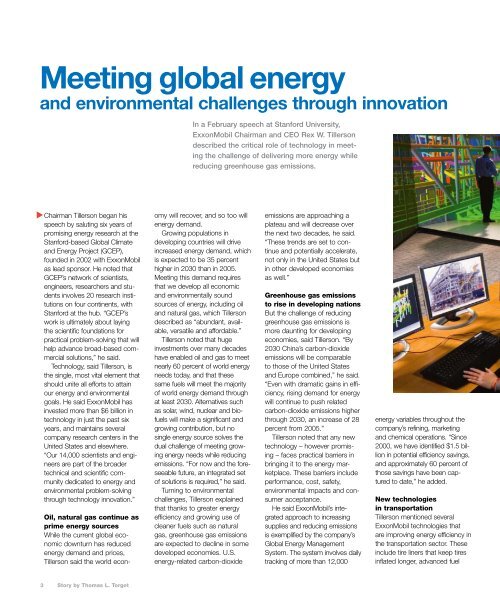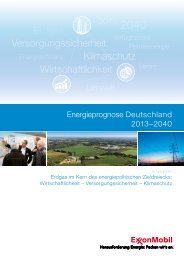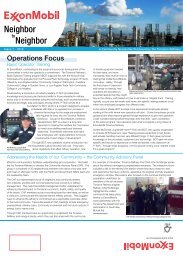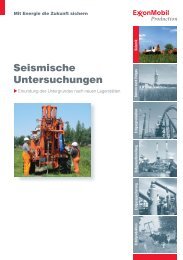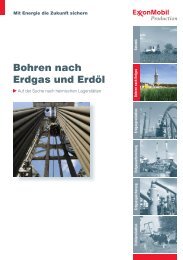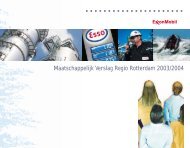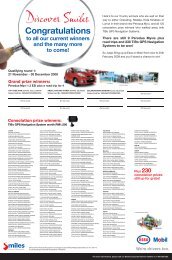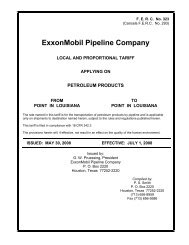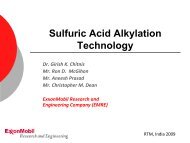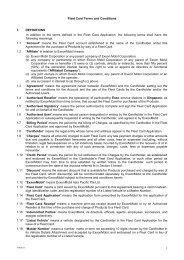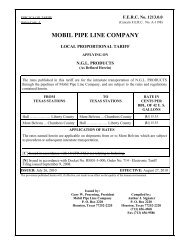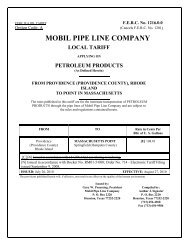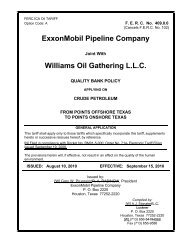ExxonMobil and Abu Dhabi
ExxonMobil and Abu Dhabi
ExxonMobil and Abu Dhabi
Create successful ePaper yourself
Turn your PDF publications into a flip-book with our unique Google optimized e-Paper software.
Meeting global energy<br />
<strong>and</strong> environmental challenges through innovation<br />
3<br />
Chairman Tillerson began his<br />
speech by saluting six years of<br />
promising energy research at the<br />
Stanford-based Global Climate<br />
<strong>and</strong> Energy Project (GCEP),<br />
founded in 2002 with <strong>ExxonMobil</strong><br />
as lead sponsor. He noted that<br />
GCEP’s network of scientists,<br />
engineers, researchers <strong>and</strong> students<br />
involves 20 research institutions<br />
on four continents, with<br />
Stanford at the hub. “GCEP’s<br />
work is ultimately about laying<br />
the scientific foundations for<br />
practical problem-solving that will<br />
help advance broad-based commercial<br />
solutions,” he said.<br />
Technology, said Tillerson, is<br />
the single, most vital element that<br />
should unite all efforts to attain<br />
our energy <strong>and</strong> environmental<br />
goals. He said <strong>ExxonMobil</strong> has<br />
invested more than $6 billion in<br />
technology in just the past six<br />
years, <strong>and</strong> maintains several<br />
company research centers in the<br />
United States <strong>and</strong> elsewhere.<br />
“Our 14,000 scientists <strong>and</strong> engineers<br />
are part of the broader<br />
technical <strong>and</strong> scientific community<br />
dedicated to energy <strong>and</strong><br />
environmental problem-solving<br />
through technology innovation.”<br />
Oil, natural gas continue as<br />
prime energy sources<br />
While the current global economic<br />
downturn has reduced<br />
energy dem<strong>and</strong> <strong>and</strong> prices,<br />
Tillerson said the world econ-<br />
Story by Thomas L. Torget<br />
In a February speech at Stanford University,<br />
<strong>ExxonMobil</strong> Chairman <strong>and</strong> CEO Rex W. Tillerson<br />
described the critical role of technology in meeting<br />
the challenge of delivering more energy while<br />
reducing greenhouse gas emissions.<br />
omy will recover, <strong>and</strong> so too will<br />
energy dem<strong>and</strong>.<br />
Growing populations in<br />
developing countries will drive<br />
increased energy dem<strong>and</strong>, which<br />
is expected to be 35 percent<br />
higher in 2030 than in 2005.<br />
Meeting this dem<strong>and</strong> requires<br />
that we develop all economic<br />
<strong>and</strong> environmentally sound<br />
sources of energy, including oil<br />
<strong>and</strong> natural gas, which Tillerson<br />
described as “abundant, available,<br />
versatile <strong>and</strong> affordable.”<br />
Tillerson noted that huge<br />
investments over many decades<br />
have enabled oil <strong>and</strong> gas to meet<br />
nearly 60 percent of world energy<br />
needs today, <strong>and</strong> that these<br />
same fuels will meet the majority<br />
of world energy dem<strong>and</strong> through<br />
at least 2030. Alternatives such<br />
as solar, wind, nuclear <strong>and</strong> biofuels<br />
will make a significant <strong>and</strong><br />
growing contribution, but no<br />
single energy source solves the<br />
dual challenge of meeting growing<br />
energy needs while reducing<br />
emissions. “For now <strong>and</strong> the foreseeable<br />
future, an integrated set<br />
of solutions is required,” he said.<br />
Turning to environmental<br />
challenges, Tillerson explained<br />
that thanks to greater energy<br />
efficiency <strong>and</strong> growing use of<br />
cleaner fuels such as natural<br />
gas, greenhouse gas emissions<br />
are expected to decline in some<br />
developed economies. U.S.<br />
energy-related carbon-dioxide<br />
emissions are approaching a<br />
plateau <strong>and</strong> will decrease over<br />
the next two decades, he said.<br />
“These trends are set to continue<br />
<strong>and</strong> potentially accelerate,<br />
not only in the United States but<br />
in other developed economies<br />
as well.”<br />
Greenhouse gas emissions<br />
to rise in developing nations<br />
But the challenge of reducing<br />
greenhouse gas emissions is<br />
more daunting for developing<br />
economies, said Tillerson. “By<br />
2030 China’s carbon-dioxide<br />
emissions will be comparable<br />
to those of the United States<br />
<strong>and</strong> Europe combined,” he said.<br />
“Even with dramatic gains in efficiency,<br />
rising dem<strong>and</strong> for energy<br />
will continue to push related<br />
carbon-dioxide emissions higher<br />
through 2030, an increase of 28<br />
percent from 2005.”<br />
Tillerson noted that any new<br />
technology – however promising<br />
– faces practical barriers in<br />
bringing it to the energy marketplace.<br />
These barriers include<br />
performance, cost, safety,<br />
environmental impacts <strong>and</strong> consumer<br />
acceptance.<br />
He said <strong>ExxonMobil</strong>’s integrated<br />
approach to increasing<br />
supplies <strong>and</strong> reducing emissions<br />
is exemplified by the company’s<br />
Global Energy Management<br />
System. The system involves daily<br />
tracking of more than 12,000<br />
energy variables throughout the<br />
company’s refining, marketing<br />
<strong>and</strong> chemical operations. “Since<br />
2000, we have identified $1.5 billion<br />
in potential efficiency savings,<br />
<strong>and</strong> approximately 60 percent of<br />
those savings have been captured<br />
to date,” he added.<br />
New technologies<br />
in transportation<br />
Tillerson mentioned several<br />
<strong>ExxonMobil</strong> technologies that<br />
are improving energy efficiency in<br />
the transportation sector. These<br />
include tire liners that keep tires<br />
inflated longer, advanced fuel


